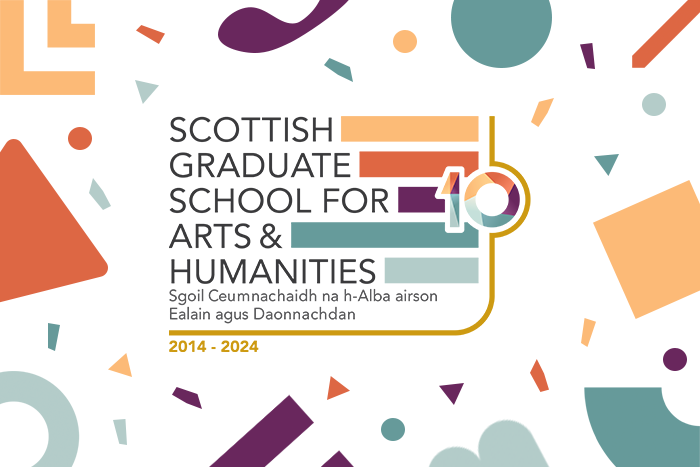SFC news published since 2018. See SFC archived content for earlier news articles.
Claire
The Scottish Graduate School for Arts & Humanities (SGSAH) began with a brilliant vision of bringing together all the Higher Education Institutes (HEIs) in Scotland that offer PhDs in the Arts and Humanities to work collectively to deliver studentships, doctoral training and development, in partnership, with funding from the Arts and Humanities Research Council and the Scottish Funding Council.
Whenever I introduce SGSAH in talks and presentations, I’m always proud to say we were the world’s first national graduate school for the Arts and Humanities and – of course – the best. I also mention that the diversity of our HEI membership is our core strength. Our HEI members – all 17 of them – range across Scotland geographically, and are varied in their subject spread and disciplinary orientations, their student body, and their own networks.
SGSAH brings all of these attributes together, uniting to demonstrate that we’re greater than the sum of our parts. Building on this collaborative ethos, we also extend outwards – working with university partners around the world through our Visiting Doctoral Researcher scheme, our EARTH Scholarships and our Global Connects programme, as well as with organisations beyond academia, through research internships, artists’ residencies, and partnership PhDs. These connections enable PhD researchers in the Arts and Humanities to come into productive conversation with multiple different perspectives, taking their research into wider worlds and learning from those dialogues.
And as we age, so our alumni body grows. After completing their PhDs our researchers have gone onto working in higher education, of course (and sometimes even supervising their own SGSAH-funded PhD researchers!), but also to a broad mix of organisations operating in multiple sectors.
What might the next 10 years bring? We’re living in uncertain times, with an uneven funding landscape in which we know there will be changes ahead. But if we stay true to that original vision, and amplify our values through collective work, SGSAH will continue.
Professor Claire Squires, Director of SGSAH.
Morag
We’re very proud to have funded the Scottish Graduate School for Arts & Humanities right from the very start.
For the Scottish Funding Council the story actually goes back a bit longer than ten years. Our archives contain a document dated 17 December 2012 asking for formal approval to fund SGSAH. A handwritten note in the margin from an SFC official involved in getting the funding off the ground, says ‘strong support from me’; a reflection of SFC’s enthusiasm for the project.
The business plan SGSAH submitted to SFC was both clear and ambitious and looked forward to ‘a potentially transformative step in changing the landscape of Arts and Humanities doctoral provision in Scotland’.
Its approach would embed ‘consortium behaviour’. SGSAH achieved this with typical speed and efficiency, and a 2017 SFC paper outlining the case for further funding expressed the belief that SGSAH had ‘over-delivered in terms of creating new-partnerships’.
SFC’s investment has included funding to support SGSAH’s pioneering Applied Research Collaborative Studentships programme. This is a great example of SGSAH’s partnership approach in action and its success is exemplified by the experience of Dr Mona Bozdog, whose story is included in SGSAH’s 10 year Review. Her SGSAH research project was a collaboration between Abertay University, the Royal Conservatoire of Scotland and the National Theatre of Scotland. Dr Bozdog has gone on to become co-lead and lecturer in Immersive Experience Design at Abertay University.
It has been a pleasure to see SGSAH become an integral part of Scottish higher education and to have had such a positive effect on its students, and – as is clear from the 10 year anniversary video – also of those who work for it. For me personally, one of SGSAH’s greatest achievements has been to allow the whole of the Scottish research training effort in the Arts and Humanities to operate to the same high standards.
I would like to congratulate everyone who has been involved with SGSAH over the past 10 years and wish the School continuing success for the next decade.
Morag Campbell, Assistant Director, Research and Innovation, Scottish Funding Council
Notes
Claire’s contribution appears in a slightly different form as the Director’s Welcome within the Scottish Graduate School for Arts & Humanities’ 10 year Review 2014-2024.


